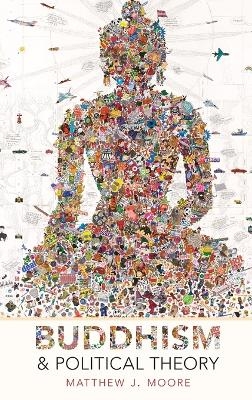
Buddhism and Political Theory
Seiten
2016
Oxford University Press Inc (Verlag)
978-0-19-046551-3 (ISBN)
Oxford University Press Inc (Verlag)
978-0-19-046551-3 (ISBN)
Buddhism and Political Theory provides a comprehensive survey and analysis of Buddhist political theory from the time of the Buddha to the present. The book provides careful readings of all of the relevant primary texts and analyzes the existing scholarship on Buddhism and politics from a wide variety of disciplines.
Despite the recent upsurge of interest in comparative political theory, there has been virtually no serious examination of Buddhism by political philosophers in the past five decades. In part, this is because Buddhism is not typically seen as a school of political thought. However, as Matthew Moore argues, Buddhism simultaneously parallels and challenges many core assumptions and arguments in contemporary Western political theory. In brief, Western thinkers not only have a great deal to learn about Buddhism, they have a great deal to learn from it. To both incite and facilitate the process of Western theorists engaging with this neglected tradition, this book provides a detailed, critical reading of the key primary Buddhist texts, from the earliest recorded teachings of the Buddha through the present day. It also discusses the relevant secondary literature on Buddhism and political theory (nearly all of it from disciplines other than political theory), as well as the literatures on particular issues addressed in the argument. Moore argues that Buddhist political thought rests on three core premises--that there is no self, that politics is of very limited importance in human life, and that normative beliefs and judgments represent practical advice about how to live a certain way, rather than being obligatory commands about how all persons must act. He compares Buddhist political theory to what he sees as Western analogues--Nietzsche's similar but crucially different theory of the self, Western theories of limited citizenship from Epicurus to John Howard Yoder, and to the Western tradition of immanence theories in ethics. This will be the first comprehensive treatment of Buddhism as political theory.
Despite the recent upsurge of interest in comparative political theory, there has been virtually no serious examination of Buddhism by political philosophers in the past five decades. In part, this is because Buddhism is not typically seen as a school of political thought. However, as Matthew Moore argues, Buddhism simultaneously parallels and challenges many core assumptions and arguments in contemporary Western political theory. In brief, Western thinkers not only have a great deal to learn about Buddhism, they have a great deal to learn from it. To both incite and facilitate the process of Western theorists engaging with this neglected tradition, this book provides a detailed, critical reading of the key primary Buddhist texts, from the earliest recorded teachings of the Buddha through the present day. It also discusses the relevant secondary literature on Buddhism and political theory (nearly all of it from disciplines other than political theory), as well as the literatures on particular issues addressed in the argument. Moore argues that Buddhist political thought rests on three core premises--that there is no self, that politics is of very limited importance in human life, and that normative beliefs and judgments represent practical advice about how to live a certain way, rather than being obligatory commands about how all persons must act. He compares Buddhist political theory to what he sees as Western analogues--Nietzsche's similar but crucially different theory of the self, Western theories of limited citizenship from Epicurus to John Howard Yoder, and to the Western tradition of immanence theories in ethics. This will be the first comprehensive treatment of Buddhism as political theory.
Matthew J. Moore is Associate Professor of Political Science at California Polytechnic State University, San Luis Obispo.
Acknowledgments
Introduction: Buddhism and Political Thought
Part I: Buddhism's Theory of Government
Chapter 1: Theory of Government and Political Theory in Early Buddhism
Chapter 2: The Traditional Buddhist Theory of Government
Chapter 3: Buddhist Modernism: 1850-1950
Part II: A Buddhist Political Theory
Chapter 4: Overcoming vs. Letting Go: Nietzsche and Buddha on the Self and Politics
Chapter 5: Theories of Limited Citizenship, East and West
Chapter 6: Buddhism, Naturalistic Ethics, and Politics
Chapter 7: Buddhist Political Theory in the Twenty-first Century
Notes
Bibliography
Index
| Erscheinungsdatum | 23.04.2016 |
|---|---|
| Verlagsort | New York |
| Sprache | englisch |
| Maße | 239 x 155 mm |
| Gewicht | 422 g |
| Themenwelt | Geschichte ► Teilgebiete der Geschichte ► Religionsgeschichte |
| Geisteswissenschaften ► Religion / Theologie ► Buddhismus | |
| Sozialwissenschaften ► Politik / Verwaltung ► Politische Theorie | |
| ISBN-10 | 0-19-046551-4 / 0190465514 |
| ISBN-13 | 978-0-19-046551-3 / 9780190465513 |
| Zustand | Neuware |
| Haben Sie eine Frage zum Produkt? |
Mehr entdecken
aus dem Bereich
aus dem Bereich
Herkunft, Blüte, Weg nach Osten
Buch | Hardcover (2024)
C.H.Beck (Verlag)
39,00 €
Von den Anfängen bis zur Gegenwart
Buch | Hardcover (2022)
C.H.Beck (Verlag)
34,00 €
warum die Religionen erst im Mittelalter entstanden sind
Buch | Hardcover (2024)
C.H.Beck (Verlag)
38,00 €


